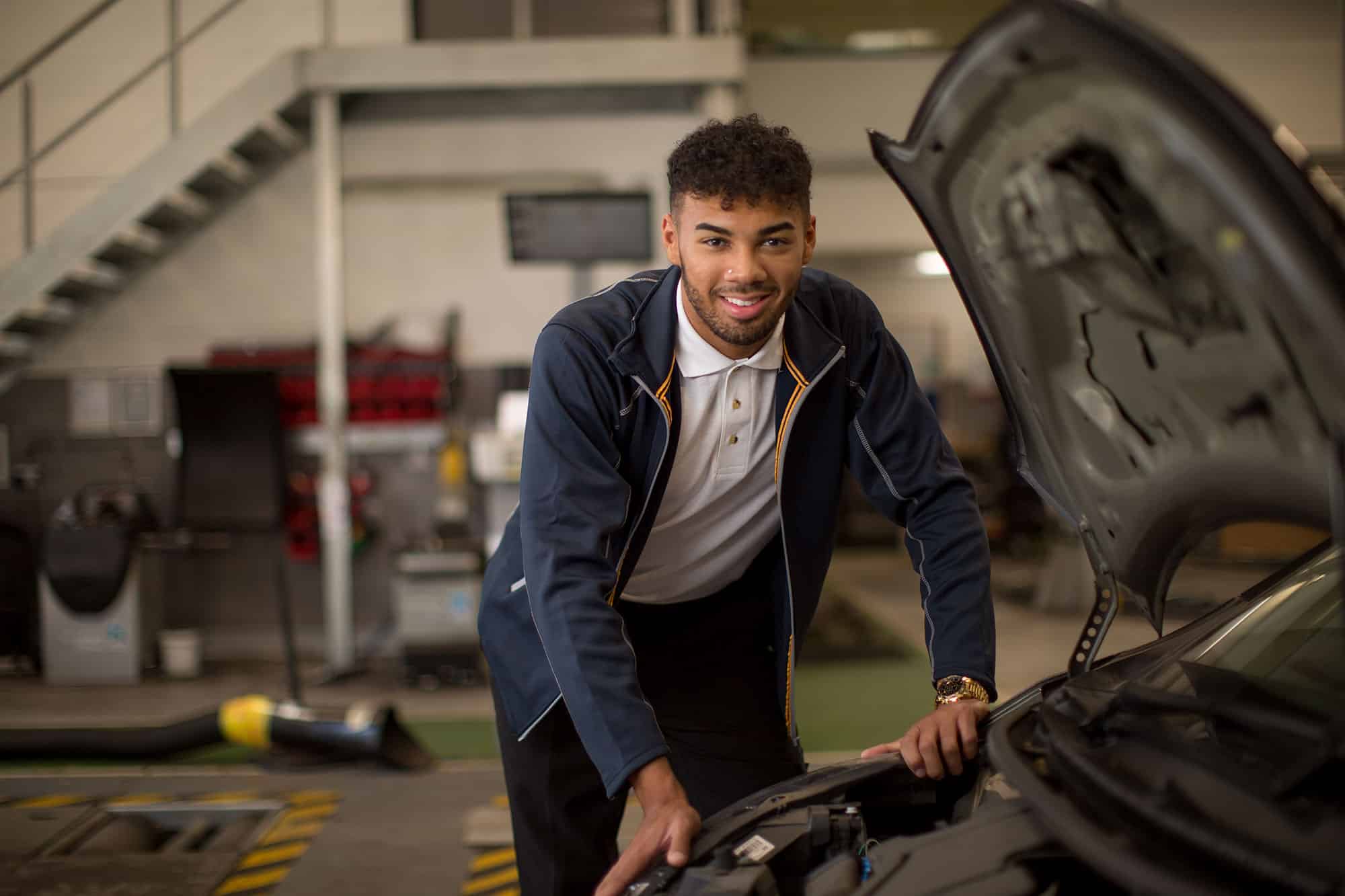Apprenticeships with Stellantis are a great way to start a career and gain valuable work experience and knowledge. In recent years, our programmes have benefitted from increased funding, helping us to focus on giving the apprentice the best training and guidance possible. With industries like ours expanding and developing, there has never been a better time to consider an apprenticeship...
As a parent it can be difficult knowing what the “right” choice is for your child. We have listed some key points below to help inform and guide you.
What is an Apprenticeship?
An apprenticeship is a job in which you receive training. Apprentices benefit from working alongside those already experienced in the industry and gain relevant knowledge and skills, as well as a formal qualification, to help them succeed in their chosen career.
Apprentices are paid a wage and are entitled to the same benefits as their colleagues, such as holiday and sick pay.
The employer will take on the costs of the Apprentices’ learning (including travel, accommodation and food when at training sessions); meaning no student debt!
Our training includes Development Coaches visiting the Apprentice in their place of work to coach, support and assess them. Some of our training is delivered on a ‘block release’ basis, where the Apprentice comes to our purpose-built Training Centre, The Performance Academy, in Coventry. This can range anywhere from 1 to 5 days every other month or two. During their time away they will continue to be paid and they will undertake practical work and classroom based learning with our team of experienced Trainers & Coaches alongside other apprentices from all over the UK.

At what level will the apprenticeship delivered?
Apprentices will work toward varying levels of qualification depending on their chosen specialism.
Intermediate Level (or Level 2) Apprenticeships are equivalent to 5 GCSEs 9-4 (A*-C). Advanced Level (or Level 3) Apprenticeships are equivalent to 2 A Levels. Higher Level (Level 4 or 5) Apprenticeships are equivalent to a Foundation Degree.
All Stellantis Programmes ensure that learners achieve a transferable qualification, that is recognised across the motor industry and which allows them to operate at a professional level. After the apprenticeship, and if a learner continues their career with us, they can continue their study within their chosen field of expertise.
Who can apply?
Our apprenticeships are open to anyone who is:
- Aged 16 or over by the end of the school summer holidays
- Living in the UK
- Not in full-time education
Entry Requirements:
Age: 16+
Prior Attainment: GCSE (or equivalent) grade A*-C or 9-4 in Maths and English. Predicated grades are accepted.
In Scotland, applicants must have or be predicted to achieve National 4 or above in English and Maths and either a Science or Technical subject. Standard Grades 1-4 and Intermediates are also accepted.
‘Equivalent’ grades include:
- BTEC first diplomas and certificates
- OCR Nationals
- Key Skills Level 2
- NVQs
- Essential Skills (Wales)
- Functional Skills Level 2
- Core Skills (Scotland)
Important facts:
- All our colleagues and trainers within The Performance Academy and based remotely are DBS checked as well as being Safeguarding Prevent trained.
- All Stellantis and The Performance Academy workplaces are health and safety checked before placing an Apprentice on site.
- Accommodation provided to learners during Block Training is approved by The Stellantis Apprenticeship Programme.

How long will my child work?
As per the law for all workers, an apprentice works a minimum of 30 hours a week and a maximum of 48 hours, or 40 for those who are under 18. This includes any time spent studying at The Performance Academy.
Apprentices are also entitled to at least one 20-minute break for every six hours they work, and at least 11 hours off between shifts.
In exceptional circumstances – for example, if an apprentice has caring responsibilities – part-time apprenticeships can be agreed by the employer, at a minimum of 16 hours per week.
Misconceptions about Apprenticeships:
As a parent, you want what is best for your child, including the best education and start in life. Our Apprenticeship Programmes are constantly being developed and adapted to make sure our apprentices have the best start when entering the world of work. Below you will find some common misinformation about apprenticeships that we have set right.
- Apprenticeships are only for the building and construction trades – and in the automotive sector they’re only for Technicians/Mechanics – The reality is, schemes are now available in a wide range of industries and specialisms. Young people today can choose to do an apprenticeship in almost anything, including aerospace engineering, banking, law, teaching and fashion. The introduction of the Apprenticeship Levy has given employers of all sizes a huge incentive to unearth future talent amongst school and college leavers.
Stellantis offer apprenticeships in roles including Business Administration, Sales & Digital Marketing.
- An Apprenticeship is not a proper job, it’s only work experience – The reality is, Apprentices are given a lot of responsibility, the work alongside professionals to ensure they are learning the correct skills. Apprentices must cover a wide range of tasks in order to successfully complete the programme. Their employer is obliged to give them practical and relevant work that supports their professional development, ensuring they come out work ready. For employers, apprenticeships are also a way of bringing fresh talent into the company and training them their way. It is therefore in their interest to ensure the skills their apprentices learn are the ones they need to succeed in the industry. It wouldn’t make sense to give them work that had little value to the business.
- Apprentices are financially worse off – In reality, each scheme offers school and college leavers the chance to kickstart their career, without the debt incurred by going to university. All apprentices are paid at least the National Minimum Wage for the first year of their apprenticeship and then increasing to the National Minimum Wage for their age for the remainder of their time on the apprenticeship. Many companies pay more to attract the best candidates.
- Apprenticeships are for underachievers – In reality, a lot of higher achieving students are skipping college and university to head straight into their chosen career. An apprenticeship is an excellent opportunity for students who prefer a hands-on approach to learning, and for those who are keen to get on the career ladder and start earning.
In the past couple of years, we have seen a significant increase in the number of applicants with top GCSE, and A level results. We also see plenty of applications from candidates with degree level qualifications.

Is my child guaranteed a job at the end of their apprenticeship?
With Stellantis, 90% of apprentices go into work or further training after completing an apprenticeship, with almost all of those staying with the same employer. In order to address skills shortages in the UK economy, the government has empowered employers to develop their own apprenticeship standards and qualifications.
As such, each scheme is designed to mould young people into highly employable professionals by equipping them with industry-relevant skills.
So, whilst there is no legal obligation to offer them a job, if an apprentice performs well in their role, it is likely the employer will really want them to stay on as a permanent employee. After all, they’ve invested a lot of time, effort and money into them.
How to find our apprenticeship vacancies?
We advertise all our vacancies on the Government Website, Reed and the Stellantis Apprenticeships Website.
